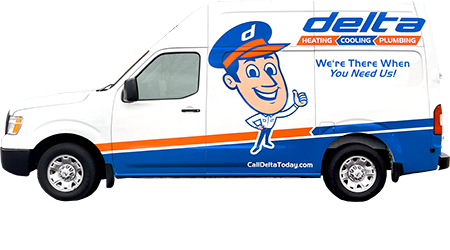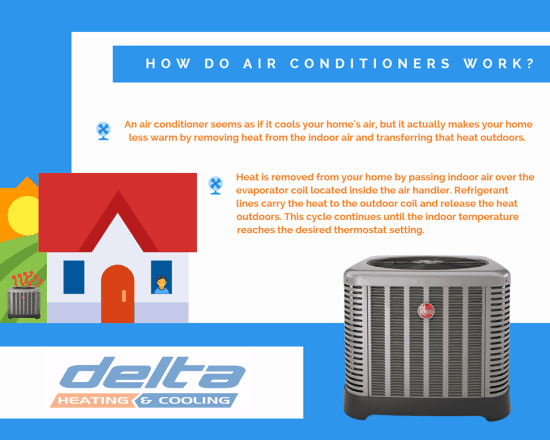How Do Air Conditioners Work?
When you come in from the stifling summer heat in Raleigh, NC, you’re probably very grateful for your air conditioning. But did you ever wonder how it works?
Like Your Refrigerator — but Bigger
Although they seem like magic, air conditioners work very similarly to refrigerators. They lower the ambient air temperature by using a basic scientific principle: When liquid converts to gas, it gobbles up heat. Taking advantage of that concept, air conditioners force the repeated evaporation and condensation of chemicals within a closed coil system.
Unlike refrigerators, however, air conditioners lack an insulating exterior housing. Instead, the walls of your home or business serve to keep the delightfully cool air inside and the hot, humid air outside.
How the Cool Air Happens
Your air conditioner includes three primary parts:
- A compressor
- A condenser
- An evaporator
Typically, the condenser and compressor are located outdoors, while the evaporator is inside and is sometimes part of your furnace. Here’s how the process works:
- Fluid flows into the compressor as a low-pressure, cooled gas. As you might guess by its name, the compressor compresses — or squeezes — the fluid’s molecules into less space, increasing the temperature and energy.
- Fluid leaves the compressor in the form of a high-pressure, hot gas that then flows to the condenser. Metal fins on the condenser help dissipate the heat.
- Now in liquid form, the former gas enters the evaporator through a small hole, pressure drops, and the liquid evaporates into a gas. As it changes form and evaporates, the liquid pulls heat from the surrounding air, which further assists in changing the liquid to a gaseous state.
- A fan in the evaporator circulates inside air and blows it across fins; the hot air in the room rises. Hot air is pulled into the air conditioner through a vent and ducts. With heat removed, inside air becomes cooler and is blown throughout the room via separate ducts.
- Fluid leaves the evaporator as a low-pressure, cool gas. It returns to the compressor and begins its journey again until the temperature reaches the desired level and the thermostat turns off the system. When the room becomes warmer, the thermostat reactivates the system until the air again reaches the desired temperature.
Keep Your Air Conditioning Running Smoothly
The ability of your air conditioner to keep your home or business cool and comfortable depends on the proper functioning of all components. Before the summer heat arrives, consider having your system serviced to keep everything running at peak effectiveness. If you’re in the Triangle area, including Raleigh, NC, contact Delta Heating & Cooling at (919) 256-5120 to schedule an appointment for service.

